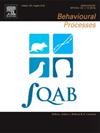Training primates to forage in virtual 3D environments
IF 1.3
4区 生物学
Q4 BEHAVIORAL SCIENCES
引用次数: 0
Abstract
Virtual environment software is increasingly being employed as a non-invasive method in primate cognition research. Familiar and novel stimuli can be presented in new ways, opening the door to studying aspects of cognition in captivity which previously may not have been feasible. Despite the increased complexity of visual input compared to more traditional computerised studies, several groups of captive primates have now been trained to navigate virtual three-dimensional environments. Here, we outline a method for training primates to use a computerised virtual foraging task presented on a touchscreen. We document how to tailor this method to groups facing different training challenges. We present data from three groups: touchscreen-experienced chimpanzees (Pan troglodytes), touchscreen-naïve orang-utans (Pongo abelii), and chimpanzees tested in a group setting. Subjects from all groups mastered basic navigation challenges with relative ease (some in as little as 16 days), setting them up for systematic studies of primate cognition within virtual environments. The training method we present is flexible, yet structured, and we encourage other researchers to adapt it to implement virtual environment research with more individuals and across more species.
训练灵长类动物在虚拟3D环境中觅食。
虚拟环境软件作为一种非侵入性的方法越来越多地被用于灵长类动物认知研究。熟悉和新颖的刺激可以以新的方式呈现,为研究圈养认知的各个方面打开了大门,这在以前可能是不可行的。尽管与传统的计算机化研究相比,视觉输入的复杂性增加了,但几组圈养的灵长类动物现在已经经过训练,可以在虚拟的三维环境中导航。在这里,我们概述了一种训练灵长类动物使用触摸屏上显示的计算机虚拟觅食任务的方法。我们记录了如何为面临不同训练挑战的群体量身定制这种方法。我们提供了来自三组的数据:有触屏经验的黑猩猩(Pan troglodytes), touchscreen-naïve猩猩(Pongo abelii),以及在群体环境中测试的黑猩猩。所有小组的受试者都相对轻松地掌握了基本的导航挑战(有些人只用了16天),为虚拟环境中灵长类动物认知的系统研究奠定了基础。我们提出的训练方法是灵活的,但结构化的,我们鼓励其他研究人员采用它来实现更多个体和更多物种的虚拟环境研究。
本文章由计算机程序翻译,如有差异,请以英文原文为准。
求助全文
约1分钟内获得全文
求助全文
来源期刊

Behavioural Processes
生物-动物学
CiteScore
2.70
自引率
7.70%
发文量
144
审稿时长
4-8 weeks
期刊介绍:
Behavioural Processes is dedicated to the publication of high-quality original research on animal behaviour from any theoretical perspective. It welcomes contributions that consider animal behaviour from behavioural analytic, cognitive, ethological, ecological and evolutionary points of view. This list is not intended to be exhaustive, and papers that integrate theory and methodology across disciplines are particularly welcome.
 求助内容:
求助内容: 应助结果提醒方式:
应助结果提醒方式:


